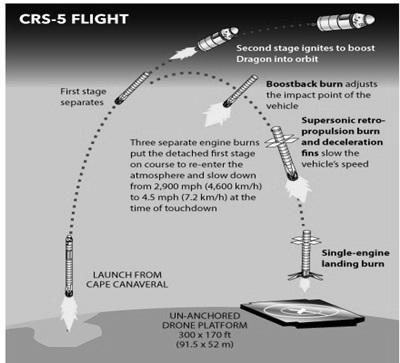Reusable Rockets: Advantages and Disadvantages
Advertisement
This page explores the advantages and disadvantages of reusable rockets, covering their benefits and drawbacks.
What is a Reusable Rocket?
A reusable rocket is a space launch system designed to recover all or part of its components for subsequent reuse. These systems can be categorized as either fully reusable or partially reusable.
Here are the specifications of the Falcon-9 reusable rocket as an example:
- Length: 68 m
- Dry mass: 25 tonnes
- Take-off mass: 506 tonnes
- Payload to LEO: Approximately 13 tonnes
- Vehicle Cost: About £40 million
- Refuel Cost: £130,000
- Reusability: About 10 flights

Figure 1: Flight of a reusable rocket developed by SpaceX to launch a Dragon cargo ship and its return to Earth.
Benefits of Reusable Rockets
Here are the key advantages of using reusable rockets:
- Cost Reduction: Launch costs are significantly lower due to the reusability of the rocket components, reducing the need for new materials each time.
- Environmental Considerations: Some reusable rockets use cleaner-burning fuels like kerosene (of rocket grade), which avoids releasing harmful chlorine into the atmosphere as exhaust. This is beneficial for environmental protection.
- Accessibility to Space Travel: Similar to airplanes, reusable rockets make space travel more accessible and affordable.
Drawbacks of Reusable Rockets
Here are the main disadvantages of using reusable rockets:
- Fuel Consumption: The rocket fuel cannot be reused. It’s expelled into the atmosphere at a high rate (e.g., 300 pounds/second) during launch and landing.
- Atmospheric Pollution: Reusable rockets produce carbon dioxide, contributing to atmospheric pollution, particularly due to emissions at the stratosphere and mesosphere layers.
- Increased Launch Frequency: The lower flight costs could lead to more frequent launches, resulting in increased exhaust emissions and a greater overall impact on the atmosphere.
Advertisement
 RF
RF






